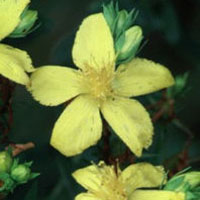Search Healthnotes
St. John’s Wort
 © Steven Foster
© Steven FosterParts Used & Where Grown
St. John’s wort is found in Europe and the United States. It is especially abundant in northern California and southern Oregon. The above-ground (aerial) parts of the plant are gathered during the flowering season.
- Reliable and relatively consistent scientific data showing a substantial health benefit.
- Contradictory, insufficient, or preliminary studies suggesting a health benefit or minimal health benefit.
- For an herb, supported by traditional use but minimal or no scientific evidence. For a supplement, little scientific support.
Our proprietary “Star-Rating” system was developed to help you easily understand the amount of scientific support behind each supplement in relation to a specific health condition. While there is no way to predict whether a vitamin, mineral, or herb will successfully treat or prevent associated health conditions, our unique ratings tell you how well these supplements are understood by the medical community, and whether studies have found them to be effective for other people.
For over a decade, our team has combed through thousands of research articles published in reputable journals. To help you make educated decisions, and to better understand controversial or confusing supplements, our medical experts have digested the science into these three easy-to-follow ratings. We hope this provides you with a helpful resource to make informed decisions towards your health and well-being.
This supplement has been used in connection with the following health conditions:
| Used for | Amount | Why |
|---|---|---|
Anxiety | Refer to label instructions | St. John’s wort has been reported in one double-blind study to reduce anxiety. |
Depression | 600 to 1,200 mg daily of a standardized herbal extract containing of 0.3% hypericin, after consulting with a qualified healthcare professional | St. John’s wort can help with mild to moderate depression—but talk to your doctor first as St. John's wort can interact with certain medications. |
Eczema | Apply a cream containing 5% of an herbal extract standardized to 1.5% hyperforin twice per day | A topical cream containing St. John’s wort was shown in one study to greatly improve the severity of eczema. The herb appears to have anti-inflammatory and antibacterial effects. |
Menopause and Depression (Black Cohosh) | Two tablets twice a day for 8 weeks, then one tablet twice a day for 8 weeks, each tablet supplying 1 mg of triterpene glycosides from black cohosh and 0.25 mg of hypericin from St. John's wort | Menopausal and depression symptoms improved in post-menopausal women after they took a combination of black cohosh and St. John's wort.
|
Seasonal Affective Disorder | Consult a qualified healthcare practitioner | St. John’s wort, an herb well known for its antidepressant activity, may improve SAD symptoms. |
Cold Sores | Refer to label instructions | In traditional herbal medicine, tinctures of various herbs including St. John’s wort have been applied topically to herpes outbreaks in order to promote healing. |
Ear Infections | Refer to label instructions | Ear drops with mullein, St. John’s wort, and garlic in an oil or glycerin base are traditional remedies used to alleviate symptoms, particularly pain, during acute ear infections. |
HIV and AIDS Support | Refer to label instructions | A preliminary trial found that people infected with HIV who took hypericin, a constituent from St. John’s wort, had some improvements in CD4+ cell counts. |
Infection | Refer to label instructions | St. John’s wort is an herb that directly attack microbes. |
Menopause | Refer to label instructions | Supplementing with St. John’s wort may improve psychological symptoms, including sexual well-being, in menopausal women. |
Ulcerative Colitis | Refer to label instructions | St. John’s wort, administered as an enema, may be beneficial for people with ulcerative colitis. |
Wound Healing | Refer to label instructions | Topically applied St. John’s wort can be used to speed wound healing. |
Traditional Use (May Not Be Supported by Scientific Studies)
In ancient Greece, St. John’s wort was used to treat many ailments, including sciatica and poisonous reptile bites. In Europe, St. John’s wort was used by herbalists for the topical treatment of wounds and burns. It is also a folk remedy for kidney and lung ailments as well as for depression.
Copyright © 2026 TraceGains, Inc. All rights reserved.
Learn more about TraceGains, the company.
The information presented by TraceGains is for informational purposes only. It is based on scientific studies (human, animal, or in vitro), clinical experience, or traditional usage as cited in each article. The results reported may not necessarily occur in all individuals. Self-treatment is not recommended for life-threatening conditions that require medical treatment under a doctor's care. For many of the conditions discussed, treatment with prescription or over the counter medication is also available. Consult your doctor, practitioner, and/or pharmacist for any health problem and before using any supplements or before making any changes in prescribed medications. Information expires December 2026.









